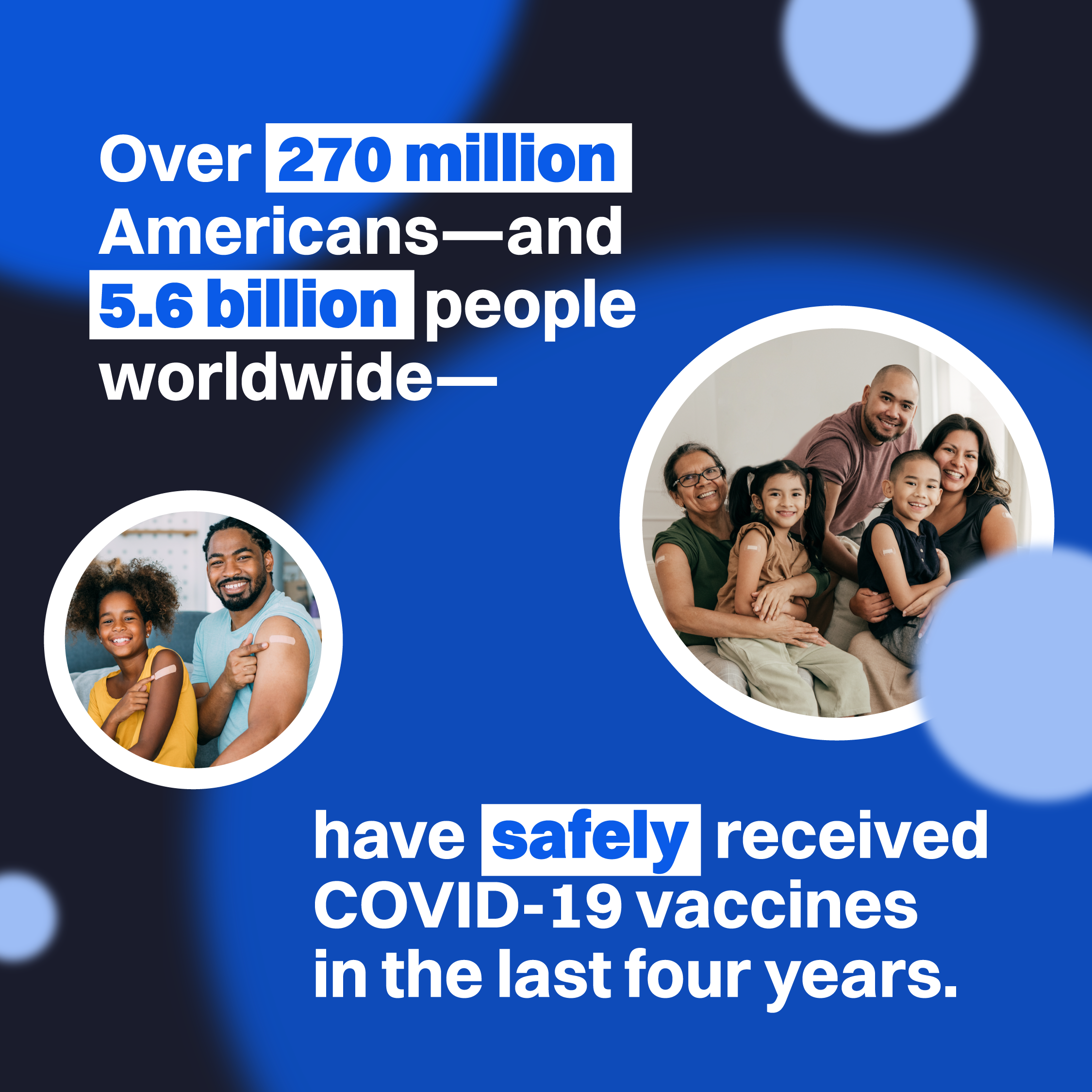False vaccine injury narratives flourish online
Although vaccine skeptics and opponents are the most frequent purveyors of false claims about COVID-19 vaccines, sometimes more legitimate sources unwittingly help circulate misleading narratives. The amplification of alleged vaccine injuries by vaccine opponents creates an environment in which even good-faith attempts to discuss vaccine safety can add fuel to the anti-vaccine fire.
In recent weeks, quotes from former health officials and articles in prestigious newspapers have been distorted and misrepresented to fit an anti-vaccine narrative. Meanwhile, bird flu conspiracy theories tap into existing false narratives about new vaccines and mRNA vaccines generally.
For even more resources, check out the menu above for real-time insights, training resources, and more. Specifically curated for people working in health care and public health, these links provide actionable content to help navigate today’s information landscape.
Trending narratives from the past month
False and misleading COVID-19 vaccine injury narratives ramp up
In early May, the New York Times published an article sharing the stories of people who believe they have COVID-19 vaccine-related injuries, discussing the challenges they face, and the role the anti-vaccine movement plays in hurting the credibility of vaccine injury reports. The article launched a wave of misleading claims, as it was heavily circulated by vaccine opponents and conspiracy theorists who falsely claim vaccine injuries are common. In the weeks that followed, two former Trump-era health officials spoke about the side effects of COVID-19 vaccines, with one stating that thousands of people could potentially have vaccine injuries and another stating that some people who received COVID-19 vaccines may have experienced “significant” side effects. Read the fact checks here and here.
AstraZeneca lawsuit and withdrawal fuels anti-vaccine conspiracy theories
Shortly after news circulated that COVID-19 vaccine manufacturer AstraZeneca acknowledged in court documents a known rare blood clot risk associated with its COVID-19 vaccine, the company withdrew the vaccine from the global market due to a “decline in demand.” Vaccine opponents—and many news headlines—are misrepresenting the news by falsely claiming that the two stories are linked and that the vaccine was pulled because of the risk, which has been publicly known since 2021. Some argued that the vaccine was developed too fast to be safe. Vaccine opponents are treating the news as vindication and insisting that they were right about vaccine safety all along. These claims contribute to larger misconceptions about COVID-19 vaccine safety and myths about vaccine injuries being covered up. Read the fact checks here and here.
Conspiracy theories about bird flu vaccines flourish online
Vaccine conspiracists are recirculating a 2023 video of former President Donald Trump saying that Democrats are planning to use new COVID-19 variants to reintroduce COVID-19 policies to influence the election. Despite there being no mention of bird flu in the video, the posts falsely claim that Trump called it “the new COVID-19” and encouraged his followers to resist new potential vaccine mandates related to the disease. Some call bird flu “nonexistent” or a manufactured disease X, while others are suspicious that an H5N1 vaccine already exists and that the vaccines are mRNA-based. The use of COVID-19 to fearmonger about bird flu (and vice versa) is a preview of what to expect in response to future pandemics. Additionally, vaccine opponents have used similar talking points about elections and political events since the beginning of the COVID-19 pandemic. Read the fact checks here and here.
What you might say in response
COVID-19 vaccines are safe, and serious adverse reactions are extremely rare.
- All medical interventions have some risks, and vaccines are no exception. The fact that an extremely small portion of vaccine recipients may have experienced serious adverse reactions does not mean that vaccines as a whole are unsafe.
- Over 270 million Americans—and 5.6 billion people worldwide—have safely received COVID-19 vaccines in the last four years with no evidence of widespread injuries.
- Independent researchers worldwide have rigorously tested and confirmed the safety of COVID-19 vaccines.
A rare AstraZeneca COVID-19 vaccine side effect was identified and reported publicly over two years ago—it is unrelated to the vaccine’s recent withdrawal.
- A rare blood clotting condition was first reported as a rare risk of non-mRNA-based COVID-19 vaccines in early 2021, resulting in some countries restricting the use of these vaccines in certain higher-risk populations. The risk is extremely low and linked only to the AstraZeneca and Johnson & Johnson COVID-19 vaccines.
- Unlike mRNA vaccines, AstraZeneca’s vaccine has not been updated for newer COVID-19 variants, making it less effective than other available vaccines.
- AstraZeneca requested the withdrawal of its COVID-19 vaccine because of low demand. The company previously withdrew the vaccine from European and Australian markets for similar reasons. Although it was never approved for use in the U.S., the vaccine is estimated to have saved 6.3 million lives in the year after its rollout.
The current risk of human bird flu transmission is low. The U.S. government is prepared to produce vaccines in case of a human outbreak.
- The video of former President Trump, in which there’s no mention of bird flu, is being used by vaccine opponents to circulate a broader anti-vaccine narrative and conspiracy theories about potential future pandemics.
- Experts agree that there is currently low risk of widespread human transmission of bird flu. Humans have infrequently contracted bird flu after coming into contact with infected animals, but human-to-human bird flu transmission is very rare. Only four human cases of bird flu have been reported in the U.S.
- The FDA has approved several human bird flu vaccines since 2007, and researchers consistently monitor bird flu virus evolution. Two H5N1 vaccine candidates are expected to be effective against currently circulating bird flu strains, and the U.S. government is moving forward with plans to produce millions of vaccine doses in case of a human outbreak.
What we’re reading
- KFF Health News: 4 Ways Vaccine Skeptics Mislead You on Measles and More
- TechTarget: MMR vaccine medical misinformation still prevalent
- UN News: Global AI summit tackles misinformation and deepfakes with a little ‘bot’ of help
Studies and trainings
- The BMJ: Behavioural interventions to reduce vaccine hesitancy driven by misinformation on social media
- Frontiers in Public Health: Management of infodemics in outbreaks or health crises: a systematic review
- The Lancet: Beyond misinformation: developing a public health prevention framework for managing information ecosystems
Interested in learning more about how to debunk false claims with patients? Check out the new Infodemiology Training Program. In videos that range from 5 to 10 minutes each, the program introduces health care providers to the basics of infodemiology and provides you with actionable skills to help improve patient care. Get started today.
Quick response media assets
Below, we've provided a social media asset in English and Spanish. Use these assets on social media to fight false claims and help provide your network with accurate information. Just right-click the asset, or press and hold on mobile, to download.

Proposed caption:
Safety matters to every person who receives a vaccine. When vaccine opponents falsely attribute illnesses and deaths to vaccines, they make it more difficult to discuss rare vaccine injuries. Fortunately, robust vaccine safety monitoring systems are in place to ensure that all vaccines are as safe as possible and that vaccine injuries remain extremely rare.

Publicación propuesta:
La seguridad es importante para todas las personas que reciben una vacuna. Cuando los negacionistas de las vacunas atribuyen falsamente enfermedades y muertes a las vacunas, dificultan la discusión sobre las lesiones raras de vacunas. Afortunadamente, hay robustos sistemas implementados para el monitoreo de la seguridad de las vacunas para asegurar que todas las vacunas sean lo más seguras posibles y que las lesiones por vacunas sigan siendo poco comunes.
